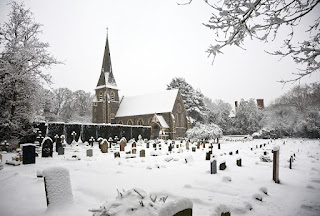A sharp midwinter frost: the Prayer Book and the Four Last Things
'Sparse' and 'stark' are words often applied, as a criticism, to the Prayer Book Order for the Burial of the Dead. Cranmer's sparse and stark burial rite was needed to undo the colourful cultus and piety of purgatory enshrined in late medieval Latin Christendom. Perhaps, however, it is no less needed today, in the face of both a sickly sentimentalism, on the one hand, and, on the other, a refusal to acknowledge the fact of our mortality. The Prayer Book's sparse, stark recognition of our mortality both strips away the sentimentalism and confronts cultural denial of death: "in the midst of life we are in death".
In its proclamation of the truth that "he shall come again in his glorious majesty to judge both the quick and the dead", the Prayer Book robustly strips away our pretensions to righteousness: whether those pretensions are couched in the terms of being enlightened and progressive or conservative defenders of culture, woke or anti-woke, sensible centrists or committed participants in the culture wars (always started, of course, by those on the other side). All these pretensions are starkly stripped away, the proclamation that "he shall come to judge the quick and dead" (repeated daily in the Apostles' Creed at Mattins and Evensong) cutting through all our claims and stances, words and actions.
It does so precisely because it is a stark proclamation. It has none of the kitsch that has often overtaken Christian piety on this matter. Whether the Doom paintings on the walls of medieval parish churches or the 'Left Behind' series of contemporary dispensationalism, kitsch - with its colour and images - blunts the sharp, stark truth of judgement. The Prayer Book has no such colour or images. Rather, the stark, sparse references to "and shall give account for their own works" (Athanasian Creed), "in the hour of death, and in the day of judgement" (Litany), and "thou most worthy Judge eternal" (Burial rite) allow no colour or images to distract or obscure the existential reality of divine judgement.
The spiritual reality of heaven is also encountered daily in Prayer Book Mattins and Evensong. Penitential sentences refer to the "kingdom of heaven" and "heaven", while in the bidding God is "our heavenly Father". Te Deum, Benedicte, and Creed all likewise make reference to heaven.
Meaning is given to these references in the Absolution, "his eternal joy"; in the Apostles' and Athanasian Creeds with "life everlasting"; and "thy heavenly kingdom" in the Prayer for the Church Militant. Again, however, kitsch is absent; so too is dramatic imagery, with its tendency to overpower and obscure. The very sparseness of the meaning given to heaven in the Prayer Book makes it more, not less, real - 'thicker' and 'heavier' - for "the hope of glory" (the General Thanksgiving) is us being "partakers of the divine nature", of which there can be no image. There is a clear, stark beauty to the Prayer Book's proclamation of the spiritual reality of heaven, infinitely more real than kitsch and dramatic imagery. In the words of Benjamin Whichcote, "What is Heaven, by way of Object, but God Himself?".
What, then, of hell? Three times each week, the Litany petitions "from everlasting damnation, Good Lord, deliver us". At the graveside, the priest prays, "O holy and most merciful Saviour, deliver us not into the bitter pains of eternal death". And twice every day, it is confessed in the Creed (following Article 3 and its Lutheran influences, a clear rejection of Calvin's interpretation which emptied of meaning this article of Creed), "He descended into hell". Again the absence of kitsch and colourful language sets before us the reality of hell, of death eternal, apart from the One who is Life and Light everlasting. The sparse minimalism of the Prayer Book's approach to hell is that which grasps and demands our attention, reflecting hell's appalling emptiness and vacuum.
We might think of the Four Last Things in the Prayer Book as a sharp midwinter frost: purifying and cleansing; cutting through pretensions and colourful deceits; allowing us to behold a new, compelling, stark beauty. In a time when the Four Last Things are either overlaid and obscured by kitsch and the dramatic, or are denied by a culture incapable of contemplating either mortality or eternity, perhaps it is a time for such a sharp midwinter frost of Cranmerian rites and prayers.As T.S. Eliot said in 'Little Gidding', "the short day is brightest, with frost and fire".





Comments
Post a Comment